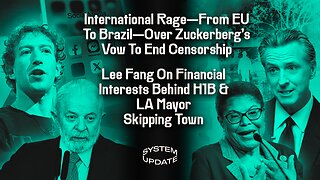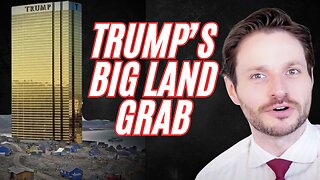Premium Only Content

How British Empire used spies to control half of the world.
The British Empire's extensive use of espionage was pivotal in maintaining control over its vast territories, which once covered about a quarter of the Earth's land surface. Here's how they utilized spies:
**Espionage Networks**: The British employed a sophisticated network of spies, both at home and abroad. Intelligence services like MI5 for domestic security and MI6 for foreign intelligence were crucial. These agencies were established in 1909 and played significant roles in both World Wars and beyond. The intelligence gathered helped in understanding the political, military, and economic conditions of regions under British influence or those of interest.[](https://www.iwm.org.uk/history/secret-war-what-you-need-to-know)
**Recruitment and Techniques**: British spies were often diplomats, consuls, or even disguised as travelers or archaeologists. They would infiltrate local societies, gather intelligence, and sometimes incite unrest to further British interests, as seen in efforts within the Ottoman Empire. They used methods like intercepting mail, employing codes, and engaging in counterintelligence to prevent enemy espionage.[](https://www.britishdeepstate.com/ottoman-empire/)
**Influence and Subversion**: In colonial settings, spies were used to manipulate local politics and to implement the 'divide and rule' strategy effectively. By understanding local dynamics through espionage, British authorities could often align or manipulate local factions or leaders to serve imperial interests. This was particularly evident in India, where understanding local alliances and rivalries was key to maintaining control.[](https://www.newyorker.com/magazine/2022/04/04/the-british-empire-was-much-worse-than-you-realize-caroline-elkinss-legacy-of-violence)
**Military Intelligence**: During conflicts, such as the American Revolutionary War or the various colonial uprisings, British intelligence was instrumental. They would gather data on troop movements, supply lines, and local support for rebels or loyalists, adjusting strategies accordingly. This included the use of both overt military intelligence units and covert operations.[](https://www.mountvernon.org/george-washington/the-revolutionary-war/spying-and-espionage/spy-techniques-of-the-revolutionary-war)
**Counterintelligence and Security**: The British were adept at counterintelligence, which involved not only gathering intelligence but also protecting their own secrets. The use of double agents, like those in Operation FORTITUDE during WWII, showcased how British intelligence could manipulate enemy perceptions and actions. This was crucial in maintaining the security of British military operations and colonial administration.[](https://www.nationalww2museum.org/war/articles/d-day-spies)
**Technological and Cryptographic Advances**: The British were at the forefront of developing new espionage technologies, notably during WWII with codebreaking at Bletchley Park. Their ability to decrypt enemy communications gave them strategic advantages in both military and political arenas.[](https://www.iwm.org.uk/history/secret-war-what-you-need-to-know)
Through these methods, the British Empire was able to exert control over a significant portion of the world by maintaining informational superiority, manipulating local politics, and ensuring that both overt and covert operations were aligned with imperial objectives. However, it's important to recognize that while effective, these strategies also led to significant human cost and resistance, shaping the narrative of British colonial history.
-
 59:49
59:49
The StoneZONE with Roger Stone
2 hours agoUpdate on Andrew & Tristan Tate w/ Lawyer Joe McBride +What will Trump do about J6ers? The StoneZONE
32.5K5 -
 1:30:04
1:30:04
Donald Trump Jr.
8 hours agoFires Rage Across LA, How Dems Destroyed the Golden state, Live with Alex Marlow, John Phillips, and Joe Bastardi | TRIGGERED Ep.206
102K167 -
 1:37:52
1:37:52
Glenn Greenwald
6 hours agoInternational Rage—From EU To Brazil—Over Zuckerberg’s Vow To End Censorship; Lee Fang On Financial Interests Behind H1B & LA Mayor Skipping Town | SYSTEM UPDATE #386
52.2K36 -
 LIVE
LIVE
Flyover Conservatives
20 hours agoInauguration Danger: Is Trump Walking Into a Trap? - Sheriff Richard Mack | FOC Show
721 watching -
 LIVE
LIVE
Precision Rifle Network
1 day agoS4E1 - Guns & Grub - Back like a bad rash!
67 watching -
 1:11:22
1:11:22
Common Threads
4 hours ago $2.04 earnedLIVE DEBATE: Trump Pushes U.S. Expansion, Cali Fires Spark Political Outrage
21K6 -
 54:46
54:46
LFA TV
8 hours agoThe LA Apocalypse | TRUMPET DAILY 1.9.25 7pm
21.1K10 -
 57:50
57:50
theDaily302
13 hours agoThe Daily 302-CORY GAUTEREAUX
26.5K -
 9:49
9:49
Tundra Tactical
3 hours ago $1.58 earnedISIS ATTACK Screams Incompetence.
24.5K2 -
 47:51
47:51
Anthony Pompliano
1 day ago $7.72 earnedRegulators Tried To End Bitcoin?!
60.5K7